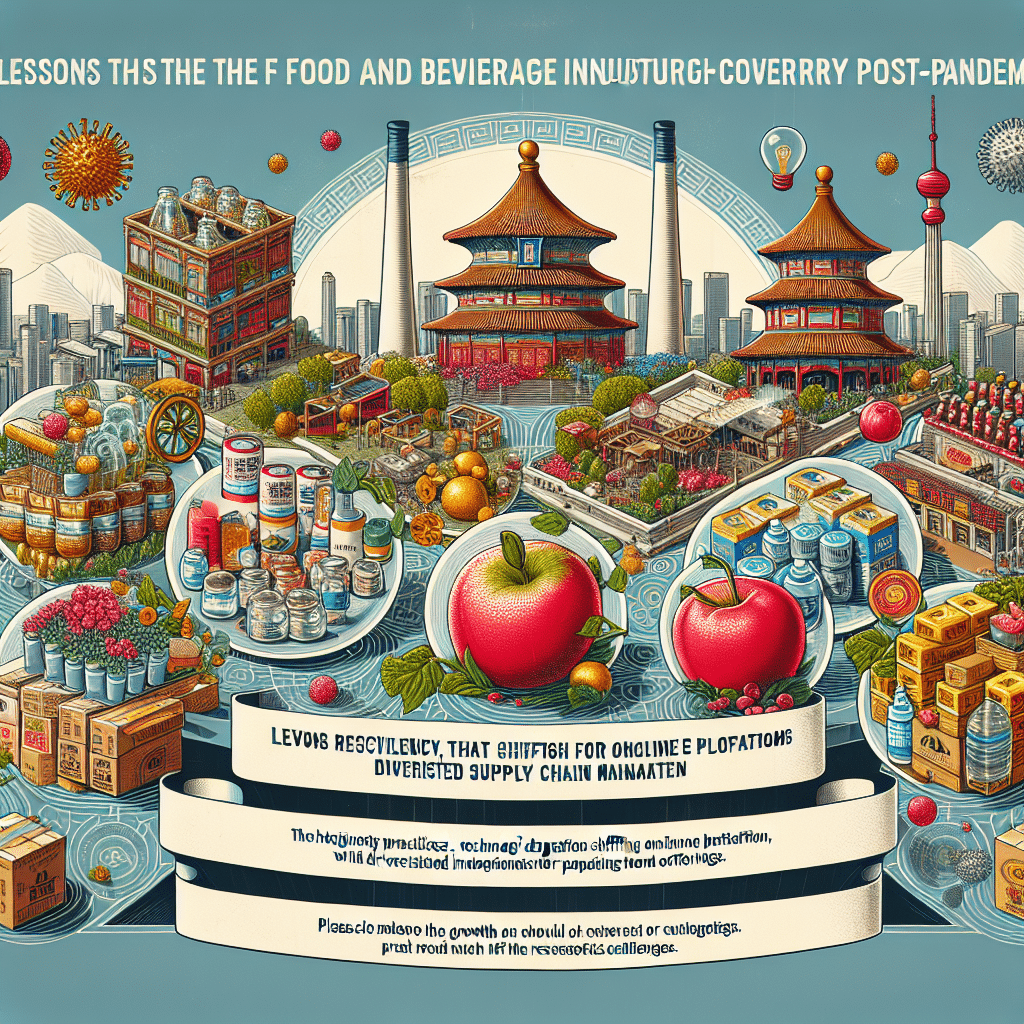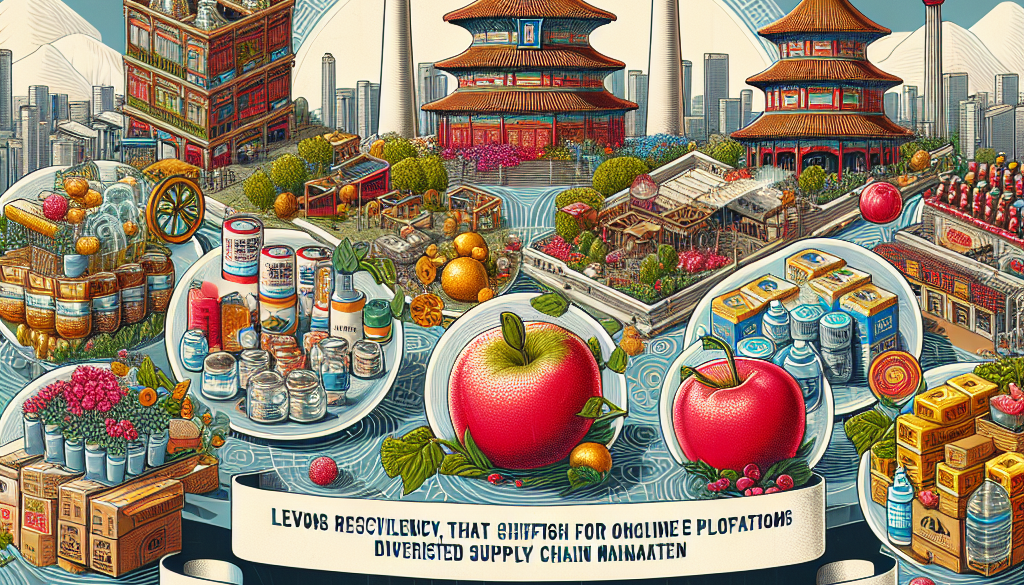6 Lessons from China’s Recovering Food and Beverage Industry After COVID-19
-
Table of Contents
- China’s Food and Beverage Industry: 6 Key Lessons from Post-COVID-19 Recovery
- Lesson 1: Embrace Digital Transformation
- Lesson 2: Prioritize Health and Safety
- Lesson 3: Adapt to Changing Consumer Preferences
- Lesson 4: Strengthen Supply Chain Resilience
- Lesson 5: Foster Innovation and Flexibility
- Lesson 6: Leverage Government Support and Policies
- Conclusion
- Enhance Your Offerings with ETprotein’s High-Quality Protein Products
China’s Food and Beverage Industry: 6 Key Lessons from Post-COVID-19 Recovery

The COVID-19 pandemic has been a significant disruptor for industries worldwide, and the food and beverage sector is no exception. China, being the first country to face the outbreak, has also been at the forefront of recovery. As the world looks to China for lessons on how to navigate the post-pandemic landscape, the recovery of its food and beverage industry offers valuable insights. This article delves into six key lessons from China’s experience, providing a roadmap for businesses looking to bounce back in the new normal.
Lesson 1: Embrace Digital Transformation
The pandemic has accelerated the adoption of digital technologies across various sectors. China’s food and beverage industry has seen a significant shift towards online platforms for ordering, delivery, and even virtual dining experiences. Companies that quickly adapted to digital platforms were able to maintain operations and even thrive during lockdowns.
- Investment in online ordering systems and delivery apps.
- Partnerships with tech companies to enhance digital capabilities.
- Use of social media and live streaming to engage customers.
For example, renowned hotpot chain Haidilao adapted by offering delivery services and DIY meal kits, ensuring their customers could enjoy their favorite dishes at home.
Lesson 2: Prioritize Health and Safety
Consumer behavior has shifted towards a heightened awareness of health and safety. Businesses that have transparently communicated their health and safety protocols have gained consumer trust and loyalty.
- Implementation of strict hygiene standards and regular sanitization.
- Introduction of contactless services and payments.
- Health checks for staff and clear communication of safety measures to customers.
Yum China, the parent company of KFC and Pizza Hut in China, introduced contactless delivery and pickup services early on, which helped reassure customers and maintain sales.
Lesson 3: Adapt to Changing Consumer Preferences
The pandemic has altered consumer preferences, with a shift towards healthier options and comfort foods. Companies that have been agile in adjusting their product offerings to meet these new demands have seen success.
- Introduction of healthier menu options and ingredients.
- Focus on comfort foods that resonate with consumers during uncertain times.
- Offering customizable options to cater to individual preferences.
For instance, brands like Genki Forest have gained popularity with their low-calorie, sugar-free beverages that cater to health-conscious consumers.
Lesson 4: Strengthen Supply Chain Resilience
The pandemic exposed vulnerabilities in global supply chains. Companies that invested in local sourcing and built robust supply chain networks were less impacted by disruptions.
- Diversification of suppliers to avoid over-reliance on a single source.
- Investment in supply chain technologies for better transparency and efficiency.
- Building relationships with local suppliers to reduce logistics challenges.
Companies like Mengniu Dairy have worked on enhancing their supply chain resilience by investing in local dairy farms and advanced logistics systems.
Lesson 5: Foster Innovation and Flexibility
Innovation has been a key driver for businesses that have successfully navigated the pandemic. The ability to pivot and introduce new products, services, or business models has been crucial.
- Development of new products to meet emerging consumer needs.
- Exploration of alternative business models, such as subscription services.
- Adaptation of physical spaces to comply with social distancing requirements.
For example, COFCO, one of China’s largest food processors, has been investing in innovation to develop new products that cater to the changing tastes and preferences of consumers.
Lesson 6: Leverage Government Support and Policies
The Chinese government introduced various measures to support the food and beverage industry during the pandemic. Businesses that were well-informed and quick to leverage these supports were able to mitigate some of the economic impacts.
- Utilization of tax reliefs and financial subsidies offered by the government.
- Participation in government-led initiatives to stimulate consumption.
- Adherence to government guidelines to ensure compliance and avoid penalties.
Companies like Tsingtao Brewery took advantage of government policies, such as tax cuts and subsidies, to weather the storm and prepare for recovery.
Conclusion
The recovery of China’s food and beverage industry post-COVID-19 offers a blueprint for businesses worldwide. By embracing digital transformation, prioritizing health and safety, adapting to consumer preferences, strengthening supply chain resilience, fostering innovation, and leveraging government support, companies can navigate the challenges and emerge stronger. These lessons are not just a response to a crisis but a strategic approach for sustainable growth in an ever-evolving market landscape.
Enhance Your Offerings with ETprotein’s High-Quality Protein Products
In line with the shift towards healthier options, ETprotein’s range of organic bulk vegan proteins and L-(+)-Ergothioneine (EGT) can help food and beverage companies innovate and meet consumer demands. Their high-purity, non-GMO, allergen-free protein products are ideal for creating nutritious and delicious offerings that cater to health-conscious consumers. By incorporating ETprotein’s products, businesses can ensure they are providing the best to their customers while staying ahead in the competitive market.
About ETprotein:
ETprotein, a reputable protein and L-(+)-Ergothioneine (EGT) Chinese factory manufacturer and supplier, is renowned for producing, stocking, exporting, and delivering the highest quality organic bulk vegan proteins and L-(+)-Ergothioneine. They include Organic rice protein, clear rice protein, pea protein, clear pea protein, watermelon seed protein, pumpkin seed protein, sunflower seed protein, mung bean protein, peanut protein, and L-(+)-Ergothioneine EGT Pharmaceutical grade, L-(+)-Ergothioneine EGT food grade, L-(+)-Ergothioneine EGT cosmetic grade, L-(+)-Ergothioneine EGT reference grade and L-(+)-Ergothioneine EGT standard. Their offerings, characterized by a neutral taste, non-GMO, allergen-free attributes, with L-(+)-Ergothioneine purity over 98%, 99%, cater to a diverse range of industries. They serve nutraceutical, pharmaceutical, cosmeceutical, veterinary, as well as food and beverage finished product distributors, traders, and manufacturers across Europe, USA, Canada, Australia, Thailand, Japan, Korea, Brazil, and Chile, among others.
ETprotein specialization includes exporting and delivering tailor-made protein powder and finished nutritional supplements. Their extensive product range covers sectors like Food and Beverage, Sports Nutrition, Weight Management, Dietary Supplements, Health and Wellness Products, and Infant Formula, ensuring comprehensive solutions to meet all your protein needs.
As a trusted company by leading global food and beverage brands and Fortune 500 companies, ETprotein reinforces China’s reputation in the global arena. For more information or to sample their products, please contact them and email sales(at)ETprotein.com today.












